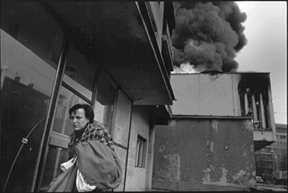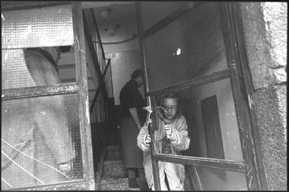|
|
|
 |
 |
|
The end was in sight in Grbavica, the last and the toughest of the Serbian strongholds, the one that had come to mean sniper, sudden death, for Sarajevo's inhabitants. The Duke and his followers had ritualistically marched out the day before, and the rumor was that, as he had promised, today "was going to be the day." The threat was clear. As smoke started to erupt over the horizon, lonely figures would rush across empty streets whose rain-drenched pavement was littered with an ever-growing accumulation of debris. Shadows would dart surreptitiously into buildings. Doors would be barricaded; fear was in the air. Those who had decided to stay were counting the hours, trying to prevent hoodlums who had come back just for the purpose of arson and intimidation from entering their buildings. As the feverish pitch of the burning of apartment buildings speeded up, the scenes encountered became more surreal. Pensioners trying to put out the fire on the blazing roof above their apartments with glasses of water; old women barricaded inside their apartments, refusing to come out even though the flames and the smoke started to lick at their doors; an older man, obviously wounded in the war, hopping along with buckets of water, rambling about injustice. In the deserted hallways with graffiti on the wall, whispers of broken English sentences could be overheard being rehearsed: "I don't speak English, but I know to say that I'm afraid." People were hoping for the long-awaited encounter with the guardian angels of IFOR: Italian paratroopers, Indonesian policemen, French gendarmes, American special forces. |
![]()